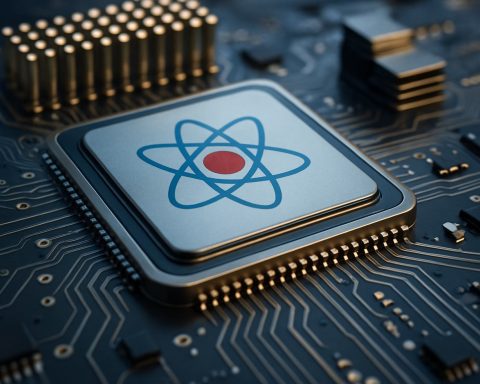A New Era for Technology Firms
The recent announcement of a groundbreaking $500 billion collaboration between OpenAI, Oracle, and SoftBank is set to revolutionize artificial intelligence infrastructure in the United States. This venture, often referred to as the “Stargate” project, is being hailed by Wall Street as a significant opportunity for leading tech companies.
Following the news, Oracle and Microsoft have experienced notable increases in their stock prices, with Oracle climbing nearly 15% and Microsoft rising about 3%. Notably, Microsoft holds an investment stake in OpenAI, linking both companies closely.
Investment analysts are optimistic about the implications of this partnership. An expert from Citi emphasized that it is likely to stimulate substantial capital expenditures driven by a rising demand for enhanced computing capabilities. Additionally, the project’s requirements for increased electricity and computing power are expected to fuel further investments in infrastructure.
Analysts from Goldman Sachs have identified Oracle and Microsoft as key beneficiaries of this government-backed initiative. While Microsoft is projected to see quicker returns due to its robust financial position, Oracle is expected to enjoy long-term gains as the demand for AI data centers rises.
Other companies like Arista Networks and Pure Storage may also see significant advantages from this venture, potentially tapping into multi-billion dollar markets. Overall, the Stargate project is poised to reshape the landscape of AI technology investment, promising extensive growth opportunities in the sector.
Revolutionizing the Tech Landscape: Broader Implications
The monumental $500 billion investment surrounding the Stargate project is not merely a financial transaction; it signals a profound shift in how technology firms will reshape society, culture, and the global economy. The partnership between tech giants like OpenAI, Oracle, and SoftBank encapsulates a broader trend where collaboration supersedes competition, aiming to accelerate innovation and productivity across industries.
As companies increase their investment in artificial intelligence, we can expect a fundamental change in job dynamics. While AI promises to enhance efficiency, it simultaneously raises concerns about job displacement in various sectors, from manufacturing to customer service. According to McKinsey, as much as 30% of jobs globally could be automated by 2030, creating a pressing need for workforce retraining and education.
Environmentally, the demand for increased computing power fueled by AI could escalate energy consumption significantly. The rise of data centers, often criticized for their ecological footprint, necessitates innovative solutions to reduce emissions and promote sustainability. As the industry evolves, there will be urgent calls for environmentally conscious practices that balance technological advancement with ecological responsibilities.
Looking ahead, the Stargate initiative could also catalyze future trends in global tech diplomacy. As nations grapple with the implications of AI in economic competition and national security, alliances may form around technological innovation. This underscores the importance of fostering international cooperation to address both the challenges and opportunities that will arise in this new era of technology.
Ultimately, Stargate represents not just a project for profit, but a pivotal moment that could define the ethical, cultural, and environmental landscape of our technological future.
A $500 Billion Blessing: How the Stargate Project is Set to Transform AI Infrastructure
A New Era for Technology Firms
The recent announcement of a colossal $500 billion collaboration between OpenAI, Oracle, and SoftBank, known as the “Stargate” project, marks a transformative milestone for the artificial intelligence (AI) infrastructure landscape in the United States. This partnership aims to reshape the technological framework surrounding AI, presenting significant implications for companies and investors alike.
Key Features of the Stargate Project
– Investment Scale: With $500 billion at stake, the Stargate project is one of the largest tech collaborations in history, aimed at enhancing AI capabilities across various industries.
– Infrastructure Development: The project is designed to bolster the computing power necessary for AI, focusing on building data centers and upgrading existing facilities to meet increased electricity demands.
Pros and Cons of the Stargate Project
Pros:
– Economic Growth: The initiative is set to generate substantial job opportunities in tech and infrastructure, promoting economic prosperity.
– Innovation Stimulation: Predictably, this venture will accelerate innovation in machine learning and data processing technologies.
– Investor Returns: Stakeholders in Oracle and Microsoft might see a significant increase in returns as the demand for AI resources escalates.
Cons:
– Market Saturation: As more companies capitalize on AI advancements, there may be a risk of market oversaturation and competition.
– Environmental Concerns: The increased energy consumption associated with large-scale AI could contribute to environmental issues if sustainable practices are not implemented.
Use Cases for the Stargate Project
– Healthcare Innovation: With advanced AI capabilities, this initiative can transform data analytics in healthcare, leading to improved patient outcomes and operational efficiencies.
– Financial Services: Enhanced AI infrastructure will allow for better fraud detection, risk assessment, and personalized services within the financial services sector.
– Autonomous Vehicles: The project could expedite AI development for autonomous driving technologies, significantly transforming transportation.
Market Analysis: Beneficiaries and Competitors
Investment analysts have pinpointed Oracle and Microsoft as key beneficiaries. While Microsoft is expected to reap quicker returns due to its strong fiscal standing and direct investment in OpenAI, Oracle is seen as a long-term winner as demand for AI infrastructure surges. Companies like Arista Networks and Pure Storage are also anticipated to thrive, potentially accessing lucrative markets within the expanding AI sector.
Predictions and Insights
As the Stargate project unfolds, experts predict that it will pave the way for unprecedented advancements in AI technology. The initial focus on infrastructure is likely to culminate in the development of cutting-edge AI applications that can be leveraged across multiple sectors.
Security and Sustainability Considerations
Given the scale of investment and the anticipated increase in data handling capabilities, security will be paramount. Companies involved must prioritize robust cybersecurity measures to protect sensitive data. Additionally, sustainability practices must be integrated into the project to mitigate the environmental impact of increased energy consumption.
For more information on technology and its evolving landscape, visit TechCrunch.
In conclusion, the Stargate project represents a significant leap forward for AI technologies, offering a bright future for participating companies and their stakeholders while simultaneously presenting challenges that must be navigated thoughtfully.














